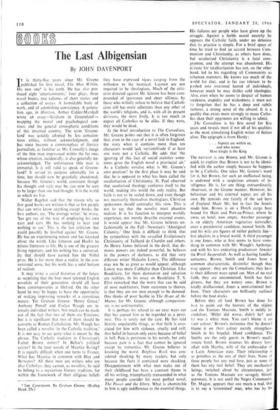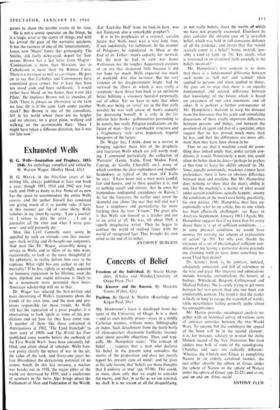D
3 r
The Last Albigensian
By JOHN DAVENPORT
TT is thirty-five years since Mr. Greene published his first novel, The Man Within. His new ones is his tenth. He has also pro- duced eight 'entertainments,' four plays, three travel books, two volumes of short stories and a collection of essays. A formidable body of work, and of astonishing consistency. A genera- tion ago, in Horizon, Arthur Calder-Marshall wrote an essay—'Graham in Greeneland'— mapping the moral and psychological con- tours and the general atmospheric conditions of this invented country. The term 'Greene- land' was quickly adopted by less conscien- tious critics, without acknowledgment, and has since become a commonplace of literary journalism, as familiar as Mr. Connolly's image of the thin man imprisoned within the fat one; whcise creation, incidentally, is also generally un- acknowledged. The unfortunate thin man is immortal. Is it still valid to speak of Greene- land? It served its purpose admirably for a time, but should now be gratefully abandoned; because Mr. Greene's world, consistent though his thbught and style may be, can now be seen to be larger than one had thought. It is the world in which we live.
Walter Bagehot said that the reason why so few good books are written is that so few people that can write know anything except books, the best authors, etc. 'The average writer,' he wrote, 'has got out of the way of employing his own eyes and ears. He has nothing to hear and nothing to see.' This is the last criticism that could possibly be levelled against Mr. Greene. He has an experiencing nature and has knocked about the world. Like Johnson and Hazlitt he relates literature to life. He is one of the greatest living reporters, and his writing has a universal- ity that should have earned him the NObel prize. He is far more than a realist, in the con- ventional sense, but his work has a solid bottom of realism.
It may strike a social historian of the future as surprising that the four most talented English novelists of their generation should all have been contemporaries at Oxford. On the other hand he may be happy to have the opportunity of making improving remarks of a censorious nature. Yet Graham Greene. 'Henry Green,' Anthony Powell and Evelyn Waugh are in- tensely individual writers. Not much can be made out of the fact that two of them are Etonians; but it is significant that two of them should be converts to Roman Catholicism. Mr. Waugh has been called a novelist 'in the Catholic tradition.' It is not easy to see quite what is meant by the phrase. The Catholic tradition in Chesterton's Father Brown stories? In Belloc's political satires? In the later novels of Maurice Baring? It is equally difficult when one turns to France. What has Mauriac in common with Bloy and Bernanos? All these men are writers who- are also Catholics; they cannot, as novelists, be 'said to belong to a mysterious literary tradition, for within the framework of their religious beliefs * Tim COMEDIANS. By Graham Greene. (Bodley Head, 25s.)
they have expressed views ranging from the orthodox to the heretical. Laymen are not required to be theologians. Much of the criti- cism directed against Mr. Greene has been com- pounded of ignorance and sheer silliness, by those who wilfully refuse to believe that Catholi- cism still has more adherents than any other of the world's religions, and is, with all its present divisions, the most lively. It is too much to expect all Catholics to be alike. If they were, they would be dead.
in the brief introduction to The Comedians, Mr. Greene points out that it is often forgotten that, even in the case of a novel laid in England, the story when it contains more than ten characters would lack verisimilitude if at least one were not a Catholic. He adds that 'the ignoring of this fact of social statistics some- times gives the English novel a provincial air.' As a Catholic novelist what is Mr. Greene's own position? In the first place it may be said that he is opposed to what has been called the secularisation of Christianity. St. Paul observed that secularised theology conforms itself to the world, making this world the only reality. But faith is not to be sealed down, and even though not necessarily themselves theologians, Christian spokesmen should contradict this view. This is not to say that the novelist must abandon realism. It is his function to interpret worldly experience, not merely describe external events. It would appear that Mr. Greene believes un- fashionably in the Fall—Newman's 'Aboriginal Calamity.' One finds it difficult to think that he sympathises with the so-called Evolutionary Christianity of Teilhard de Chardin and others. As Henry James believed in the devil, that de- monic powers are indeed powerful, he believes in the powers of darkness, as did that very different writer Malcolm Lowry. The difference may not be as great as would appear, although Lowry was more Cabbalist than Christian. Like Baudelaire, for them damnation and salvation are realities. In his essay on Baudelaire T. S. Eliot remarked that the worst that can be said of most malefactors, from statesmen to thieves, is that they are not men enough to be damned. One thinks of poor Scobie in The Heart of the Matter, for Mr. Greene, although compassion- ate, is no sentimentalist.
It is perhaps his refusal to see easy ways out that has caused him to be regarded as a pessi- mist. This is surely not the case. He has said bitterly unpalatable things, as that faith is asso- ciated for him with violence, cruelty and evil; that belief in heaven only exists because of belief in hell. Pain is persistent in his novels, but only because pain is a fact that cannot be ignored except by romantics. Mr. Greene believes in knowing the worst. Brighton Rock was con- sidered shocking by many readers, but only because the facts it contained were shocking. Disappointment with what men make out of their childhood has been a constant theme in all his writing, triumphantly transcended in what many people consider his most perfect novel, The Power and the Glory. What is abominable to him is ugly indifference to the essential things. His failures are people who have given up the struggle. Against a feeble moral anarchy he opposes the Catholic faith, under no delusion that its practice is simple. For a brief space of time he tried to find an accord between Com- munism and Christianity, as others have done, but secularised Christianity is a fatal com- promise, and the attempt was abandoned. His distaste for totalitarianism has not, on the other hand, led to his regarding all Communists as inhuman monsters. He knows too much of the world for that, and is far too tolerant to be pushed into irrational hatred of individuals, however much he may dislike cold ideologies. Also, even when he seems to despair of human weakness, stupidity and wickedness, it must not be forgotten that he has a deep and subtle humour, a strong sense of the absurd. It is a quality that exists more strongly in many Catho- lics than their opponents are willing to admit.
,The Comedians is his first novel for five years and reveals most if not all of his qualities as the most stimulating English writer of fiction alive. The epigraph is from Hardy: . . . Aspects are within us, and who seems
Most kingly is the King.
The narrator is one Brown, and Mr. Greene is quick to explain that Brown is not to be identi- fied with the author simply because he happens to be a Catholic. One takes Mr. Greene's word for it, but Brown, for such an ineffectual being, is endowed with a suspicious amount of in- telligence. He is, for one thing, extraordinarily observant, in the Greene manner. However, his behaviour and his external aspect are all his own. He reminds one faintly of the sad hero of England Made Me, but in fact the Jesuits made him. Brown is on a Dutch cargo boat bound for Haiti and Port-au-Prince, where he owns an hotel, now empty. Another passenger is an elderly American vegetarian teetotaller, once a presidential candidate, named Smith. He and his wife are figures of rather pathetic fun— lost idealists in a brutal world. A third passenger is one Jones, who at first seems to have some- thing in common with Mr. Waugh's Apthorpe, 'and with his less endearing predecessor Atwater (in Work Suspended). As well as having familiar surnames, Brown, Smith and Jones have a common characteristic, dissimilar though they may appear: they are the Comedians; they have in their different ways opted out. Men of no real faith, they are uncommitted. Smith has faint gleams, but they are watery ones. Brown is totally disillusioned, Jones a semi-criminal buf- foon. Their characters are brilliantly outlined before the boat docks.
Before they all land Brown has done his best to point out the horrors of the regime and the Tontons Macoute. Smith is mildly in- credulous. 'Hitler did worse, didn't he? and he was a white man. You can't blame it on their colour.' Brown's insistence that he doesn't blame it on their colour merely strengthens Smith in his hopeful, bland confidence. The Smiths are the only guests in Brown's madly ornate hotel. Brown resumes his dreary love- affair with Martha, wife of the ambassador of
Latin American state: Their relationship is as pointless as the rest of their lives. None of these people has any real love, just as none of them has any real belief. They are mechanical beings, twitched about by circumstance, just as the Tontons Macoute are savagely bloodY _outomata. It is not until the Negro Communist, r. Magiot, appears that one meets a real, that is to say a 'committed' man, who has by his
nature to share the terrible events of his time.
He is not a comic spectator on the fringe, he is a tragic actor at the centre of things, and with his arrival the pace of the narrative quickens. It has the raciness of one of the 'entertainments.' Jones, now 'Major' Jones. dies grotesquely. The Smiths, still fairly dewy-eyed, depart for Ten- nessee. Brown has a last letter from Magiot : 'Communism is more than Marxism, just as Catholicism is more than the Roman Curia. There is a mystique as well as potitique. He goes on to say that Catholics and Communists have committed great crimes. but at least they have
not stood aside and been indifferent : would rather have blood on my hands than water like Pilate.' He implores Brown not to abandon all faith. There is always an alternative to the faith we lose. Or is it the same faith under another mask? But Brown is one of the comedians, left in his world where there are no heights and no abysses, on a great plain, walking and walking on the . interminable flats: 'Once I might have taken a different direction, but it was too late now.'



































 Previous page
Previous page